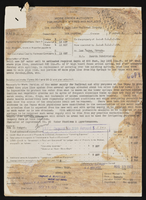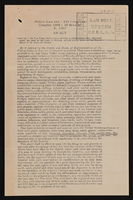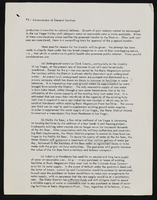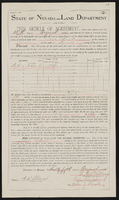Search the Special Collections and Archives Portal
Search Results
Sister Klaryta Antoszewska Photograph Collection
Identifier
Abstract
The Sister Klaryta Antoszewska Photograph Collection (1977-1991) consists of photographic slides that depict various Nevada, United States, and international nuclear test protests. The collection includes images of Sister Klaryta Antoszewska and Sister Rosemary Lynch, as well as images of the Lenten Desert Experience and numerous protests at the Nevada Test Site. Also included are images of nuclear testing, soldiers, and anti-nuclear testing promotional materials.
Archival Collection
Gay and Lesbian Community Center of Southern Nevada Photograph Collection
Identifier
Abstract
The Gay and Lesbian Community Center of Southern Nevada Photograph Collection contains mainly candid photographs of events and individuals affiliated with the Las Vegas-based Gay and Lesbian Community Center of Southern Nevada (GLCCSN) dating from 1993 to 2000. Photographs depict events honoring prominent members of the gay, lesbian, bisexual, transgender, and queer community; meetings at GLCCSN; and candidate nights for members of the community running for public office. The collection also includes a number of photographs of the Freedom to Marry celebration at the GLCCSN and the Gay Pride Las Vegas festival from 1998 to 1999.
Archival Collection
University of Nevada, Las Vegas Office of the President Records
Identifier
Abstract
The University of Nevada, Las Vegas (UNLV) Office of the President Records is comprised of documents used in daily matters of the Office of the President from approximately 1950 to 2007. The records in the collection document the expansion of the UNLV campus, and the academic and athletics programs offered by the university.
Archival Collection
Ferron and Bracken Photograph Collection
Identifier
Abstract
The Ferron and Bracken Photograph Collection depicts Southern and Central Nevada and other western states from 1890 to 1961. The photographs primarily depict the development and growth of early Las Vegas, Nevada; mines and mining operations in Southern and Central Nevada; towns and mines in Nevada; and the Hoover (Boulder) Dam and the Colorado River.
Archival Collection
Stella Champo Iaconis oral history interviews
Identifier
Abstract
Oral history interview with Stella Champo Iaconis conducted by Kay Long on May 14, 1997, May 21, 1997, May 26, 1997, and September 22, 1997 for the Women's Research Institute of Nevada (WRIN) Las Vegas Women Oral History Project. Iaconis opens her interviews discussing her difficult upbringing and life on a ranch in Las Vegas, Nevada with her dad in the 1910s and 1920s. Iaconis then describes her experiences as a waitress in Las Vegas. As the interviews continue, Iaconis discusses Block 16 and sex work, the Helldorado Days, and life in 1930s Las Vegas. Iaconis ends the interview talking about her father and his career as a miner; her many husbands; and her personal history in Las Vegas.
Archival Collection





